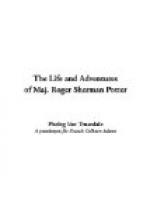Having journeyed about two miles, I reached a cross-road, and saw approaching one of those great wagons familiarly known in that part of the country as “tin wagons.” It was drawn by an exceedingly lean, gray horse; and a short, fat man, with a broad, florid face, beaming with good nature, was mounted upon a high seat, made of a bundle of sheepskins. He was squint eyed, spacious mouthed, and had a nose that was flat to the end, which turned up in a short pug. His hair was of a sandy color, and parted carelessly down the center; and his dress was of well-worn gray satinet, which sat loosely upon his rotund figure. His hat, of soft black felt, was drawn well down over his low forehead, and but for his beard, which was thick and matty, one might easily have mistaken him for a cross between a Dutch washerwoman and a pumpkin-bellied quaker.
His team moved along at a measured pace, as if keeping time to the song he was singing, with great flow of spirits, for his own entertainment. I waited until he came up, much amused at the manner in which he every few minutes cracked his big whip. “Stranger!” said he, in a shrill, squeaking voice, “which way are you journeying?-what can I do to serve you this morning?” He reined up his team, and dismounting in a trice, extended his hand with a heartiness I was surprised to find in a stranger. “Jedediah Smooth, the renowned fisherman, is my father, and I have set out in search of fame and fortune,” was my reply. At this he set his small, but searching eyes upon me, and seemed confounded, the cause of which I was not a little anxious to learn.
“Son of the worthiest of fathers!” he exclaimed, in a voice of great earnestness, “my delight at meeting one whose fame as a politician has preceded him, knows no bounds.” Again he shook my hand fervently, as a pleasing delirium seemed to have seized upon his senses. “Accidents are sometimes equal to conquests,” he continued. “Know, then, that you confront Major Roger Sherman Potter, commonly called Major Roger Potter. Like a titillation of the fancy, I have been thrown up and down by the tide of political fortune and misfortune until I became sickened of it, and resolved to seek obscurity, and live like an honest man by the sale of tin, and such wares as the good people of this remote part of the world might have a demand for. You must not judge me by the calling necessity has now forced me to follow, for I hold it right, and in strict accordance with the nature of our institutions, that when fortune forsakes us, we stand not upon the order of a reputation, which at best is but a poor thing in time of need, but give ourselves manfully to any labor by which our hands may preserve the honesty of our heads. It is much better, I think, than following the fashion of our politicians, who reward the people who send them to Congress by neglecting their duty to the country, and studying those arts by which they can appropriate to themselves the choicest spoils.”




